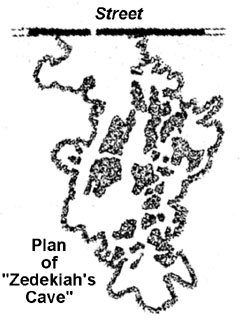|
The ARK OF THE
COVENANT continued...
This and other similar incidents led Ron to seal the passage. With the
honeycomb of tunnels, it would be almost impossible for anyone to find the
correct passage, and this one now looked - even up close - as if it was a
natural stone wall. Ron had done all that he could do using that passageway,
anyhow. It would be impossible to get any large object out of the chamber
through that original passage. All his attempts to photograph anything in the
chamber resulted in photos or slides that looked like a complete blur, so he
concluded that he simply wasn't supposed to take any photographs. (He later
understood why - at that time, he was much freer with sharing his information
and this could have caused a lot of serious problems if some of the
"unsavory characters" he came in contact with over the years had SEEN
evidence that this solid gold object REALLY existed. Remember how Noah's wife's
grave was plundered.) The next order of business would be to find the main
entrance into the chamber - the passage through which the items were originally
taken.
The Original Passage Used to Carry the Ark into the Cave
Before permanently sealing the passageway, Ron had gone into the chamber with
the Ark and opened the original entrance to see if he could follow it to its
point of origin. When he opened it, he discovered on the other side a very large
tunnel which extended in both directions. He observed that the tunnel appeared
to be a natural tunnel that had been enlarged as he saw chisel marks. But the
bad news was that it was completely blocked with large stones in both
directions. The problem now to be solved was determining the path taken by those
who put the items in the chamber.
To resolve this question, Ron began by using simple reason. The items had
been in the temple - that was their point of origin. They were now in this
chamber, many feet below ground level. A great number of tunnels have been found
under the temple mount and the city, but none that he knew of were heading in
this direction. Was the entrance into the tunnel within the city or was it
somewhere across the street in front of the northern wall? Ron had an idea as to
where to begin his search.
"Zedekiah's Cave"
In the winter of 1854, Dr. Barclay, a physician and missionary, went for a
walk in Jerusalem. He was walking to the site of the traditional
"Jeremiah's Grotto" which is along the same Calvary escarpment. As he
walked past the Damascus Gate, suddenly his dog, running ahead of him, vanished.
As he searched for his dog who didn't respond as he usually did to his owner's
whistles, he heard a muffled barking coming from the direction of the city wall.
When he approached the wall, he noticed a deep hole and when he peered inside,
he heard his dog's familiar bark. And this is how "Zedekiah's Cave"
was discovered (or rediscovered).
This vast cavern is located underneath the Muslim section of the city,
extending 750 feet into "Mt. Moriah", beginning at the trench or dry
moat separating the northern and southern portion. It is 325 feet wide at the
maximum point and the average height is almost 50 feet. It was clearly a stone
quarry, but at what point it was in use, we really do not know. There are those
who believe its stone was used in the first temple, and that may be true. But
its existence was not a well known fact and most likely it was always kept
completely sealed for fear of any enemies trying to tunnel into the city. So
little is known for sure about the giant quarry, but one point everyone agreed
on was the fact that there was no entrance into the city from the quarry.
Viewing the diagram of its layout, the dark areas are pillars of solid rock
left in place to support the ceiling, like the pillars left in a coal mine. As
the miners work their way back out of the mine after depleting it of all its
coal, they remove these pillars of coal and the mine usually caves in. These
were obviously left in place to prevent the cavern from collapsing since part of
the northern city is above it. As Ron examined the quarry carefully, he noticed
one thing that bothered him.
 When Ron tackles a project, the first thing he does is determine the easiest
way to accomplish the task that requires the least work and as he walked the
giant quarry, something didn't make sense. He tried to put himself in the
"shoes" of the ancient stonecutters as he surveyed this massive
quarry. When Ron tackles a project, the first thing he does is determine the easiest
way to accomplish the task that requires the least work and as he walked the
giant quarry, something didn't make sense. He tried to put himself in the
"shoes" of the ancient stonecutters as he surveyed this massive
quarry.
Seeing how deep into the side of the mountain the quarry extended, he thought
about how much work it would have been to bring all that stone out of the
quarry, carry it through one of the northern gates and into the city. It would
have been easier to quarry it out of the quarry across the street than to haul
it out of that cavern. To Ron, the solution was obvious - to cut a hole through
the ceiling of the quarry and simply haul the rocks up into the city. The more
he thought it about, the more obvious it became to him - yet, no one had ever
found an entrance into the quarry from the city. So Ron began to examine the
rock pillars.
And sure enough, he found one that wasn't a stone pillar at all. It was a
giant mound of earth and debris, piled up, he believed, to the ceiling and
through the hole in the ceiling. On the surface it would look like normal
ground. But unable to examine the section above ground, he didn't know if the
rock had been cut in a manner that would allow the cut-out section to fit back
over the hole like a "man-hole cover" or if it was only the piled up
earth that filled the hole. But he was convinced that the hole is there.
Time Passes By
Danny and Ronny were now young men with lives of their own. They both
entered into specialized areas of construction work and had responsibilities
which didn't allow them the luxury of taking off work to travel back and forth
to the Middle East. With the passageway that led to the chamber that held the
Ark now solidly blocked, Ron had to rely on others to help with the work. Just
since the time I entered the picture (1988) I've seen the hazards of having to
rely on people Ron didn't know too well. Sometimes, he had wonderful volunteers
who were willing to follow instructions and abide by the rules. Other times,
people who seemed like nice, trustworthy folks turned out to be a
"cursing" instead of a blessing. The "Ark of the Covenant"
seemed to attract its fair share of those who had "their own agenda."
Continue reading about
the Ark of the Covenant...
| 


 When Ron tackles a project, the first thing he does is determine the easiest
way to accomplish the task that requires the least work and as he walked the
giant quarry, something didn't make sense. He tried to put himself in the
"shoes" of the ancient stonecutters as he surveyed this massive
quarry.
When Ron tackles a project, the first thing he does is determine the easiest
way to accomplish the task that requires the least work and as he walked the
giant quarry, something didn't make sense. He tried to put himself in the
"shoes" of the ancient stonecutters as he surveyed this massive
quarry.